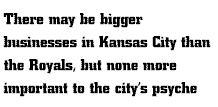|

What separates the Blue Chips and the Bulls is not so much money as it is money and power over time. The Bulls simply have not been around long enough to build a legacy, or have not until recent years had enough money to build a legacy on, but they have endured well through lean times and give every indication of sticking around for the long haul.
A recent"Star 50" list from The Kansas City Star regretted the fact that"the list has no chief executive officers who are women or minorities." Although our list includes a number of women, there remains an absence of Blacks and Hispanics in real positions of corporate power in Kansas City. Rather than conceal the problem by falsely imputing power to those who do not have it, we have chosen to present an honest listing and let others debate why power is distributed the way it is.
Perhaps at the head of this pack is Cerner's Neal Patterson. Patterson is Chairman of the Board, Chief Executive Officer and co-founder of Cerner Corporation, the world's leading clinical healthcare information technology company and quite possibly Kansas City's iconic company of the future. Indeed, it is one of America's few tech companies to keep hiring and growing right through the tech shakeout of the last few years. Co-founder and Vice-Chairman Cliff Illig has also played a large role in Cerner's success.
Mike Haverty, president and CEO of Kansas City Southern Railway and Chairman of Kansas City Southern Industries, ignored the critics and took the steps necessary to build the NAFTA Railway, for which move he was named Railway Age's "Railroader of the Year" last year. Speaking of mobility, Haverty is a fourth-generation railroader from a blue-collar family. His Irish immigrant great-grandfather laid track on the Central Branch of the Union Pacific.
 There may be bigger businesses in Kansas City than the Royals, but none more important to the city's psyche than the Kansas City Royals. David Glass may have saved the team two years ago, but he has not made it a winner. This has brought the boo birds out, but Kansas City legend George Brett is not among them."People need to get off David Glass' back," Brett was quoted as saying recently. He argued that Glass is doing all he can to keep the payroll — which will be around $40 million this year — as competitive as possible. “Ask yourself what the payroll would be like if Miles Prentice had the team? Twenty million?" Son Dan Glass serves as the Royals' president. All that separates the Glasses from the Blue Chips is a World Series. We all hope they invest wisely. There may be bigger businesses in Kansas City than the Royals, but none more important to the city's psyche than the Kansas City Royals. David Glass may have saved the team two years ago, but he has not made it a winner. This has brought the boo birds out, but Kansas City legend George Brett is not among them."People need to get off David Glass' back," Brett was quoted as saying recently. He argued that Glass is doing all he can to keep the payroll — which will be around $40 million this year — as competitive as possible. “Ask yourself what the payroll would be like if Miles Prentice had the team? Twenty million?" Son Dan Glass serves as the Royals' president. All that separates the Glasses from the Blue Chips is a World Series. We all hope they invest wisely.
As co-CEO with son Larry Van Tuyl, Cecil Van Tuyl presides over a family business second only to Hallmark in the region. Van Enterprises (VT, Inc.) is the nation's largest privately-owned automotive dealership group, operates more than 30 dealerships in some 10 states, and sells more than 120,000 new cars per year. Still, Van Tuyl manages to make the local news only through his forays into the Plaza real estate market, including his current planned venture on a 2.4-acre parcel on the north side of Ward Parkway.
Lending assistance to Van Tuyl is the city's biggest and arguably one of the best landlords, DST. Although its stock has taken a hit this past year, DST, under the inspired leadership of president and CEO Tom McDonnell, has almost single-handedly renovated Kansas City's central business district, Just as importantly, DST provides work for nearly 5,000 employees in the Kansas City area alone.
With Henry Bloch comfortably retired, the 44-year-old Mark Ernst has begun to assert himself at H&R Block, one of America's ten best-known brands. In the last two years he has presided over the resurgence of H&R Block stock, roughly 70% higher than it was at the time of our last Power Elite. Now, if Ernst can only make those nettlesome class action lawsuits go away.
|